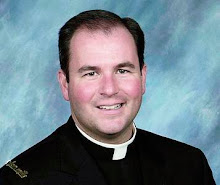Dear friends in Christ,
This past Friday, the Vocation Office for the Diocesan Priesthood hosted and sponsored an "Evening for Young Men at the Seminary", which included a talk by Cardinal Rigali, Fr. Chris Rogers (the Vocation Director), a video on seminary life and discernment, a candlelight procession, and a Holy Hour. The night was a tremendous success, and there had to be over 200 people there altogether, and we only expecting about 170. But you know, it was a success not because of the numbers, but because I saw the guys who were there, and you can tell that they were touched, and their hearts were moved. And we got back many information cards stating that they were interested in the priesthood. Even though I coordinated the event, I couldn't have done it without my team of seminarians who helped me out with the procession and the Holy Hour. There are too many to thank individually here, but they know who they are, and I graciously thank you for your hard work.
Part of our follow-up from the evening is that the young men wrote questions on index cards. We have gotten at least 75 index cards back, so this blog will be used to answer some of the questions that were posed.
The first question: "Why is the priesthood like the military in the sense of being sent to a random parish and not being able to choose?"
This is an interesting analogy that you can use when talking about parish assignments. There are many things on which we can meditate from this question. The first is the promise of obedience that priests give at the time of their ordination to the priesthood. At the time of ordination, the candidate must make two promises, the first to chastity and the second to obedience. For many people, the promise of chastity is hard, and we will tackle that in other posts. Obedience though, can be equally hard, and from what priests tell me, the older a priest gets, the harder obedience gets. A man is called to serve a specific diocese, like the Archdiocese of Philadelphia. Being sent to a parish and not being able to choose is a necessary following of this virtue of obedience that a priest is expected to take up. A priest pledges obedience to the bishop, so the bishop as a result, can send the priest wherever the priest may be needed.
This obedience is also practiced in the military as well. A soldier is sent where he is needed. When talking about obedience, there is the theological understanding of it, as a priest laying down his life, and being obedience, like Christ was obedient. A husband and wife are called to be obedient to each other, and a priest is called to be obedient to the Church in a special way. He is married to the Church, so when the Church needs something, a priest is supposed to provide it if he can. So, to go back to the question, it is a result of the virtue of obedience that seminarians learn before they become priests that help them take any assignment that they are given.
Obedience also points to an important to the truth that our life is not our own. Our life isn't intended to be self-centered, but rather flowing out to something or somebody else. When our life isn't our own, we realize that it is a gift, a gift to be shared. When a priest willingly takes the promise of obedience, he recognizes that gift that he is called to give to the Church.
Another point that needs to be made are random parishes. First, there is no such thing as a random parish. Every parish is there for the purpose of providing the sacraments to the local people as a way to help them to get to heaven. Every parish is important for this purpose. Some parishes might be smaller, but they serve the same purpose as the larger parishes.
So, we must ask ourselves, are we obedient? Do we listen to those in authority as a way to cultivate the virtue of obedience? Whatever you are called to, we must always remember that obedience is a prime factor in it, whether it be the priesthood, religious life, or married life. For those who have trouble listening, I encourage you to try to start listening and obeying. Obedience isn't easy, but by continuing to practice obedience, you will be made holy by it. Obedience isn't the end result of obedience, but rather being made holy is the end result of obedience, and it is through our sanctification (being made holy) that we can be given heaven when we die.
May you remain close to the Sacred Heart of Jesus through the Immaculate Heart of Mary.
St. John Vianney, pray for us.
Posted by Bobby Murphy.
Tuesday, January 20, 2009
Subscribe to:
Post Comments (Atom)







No comments:
Post a Comment